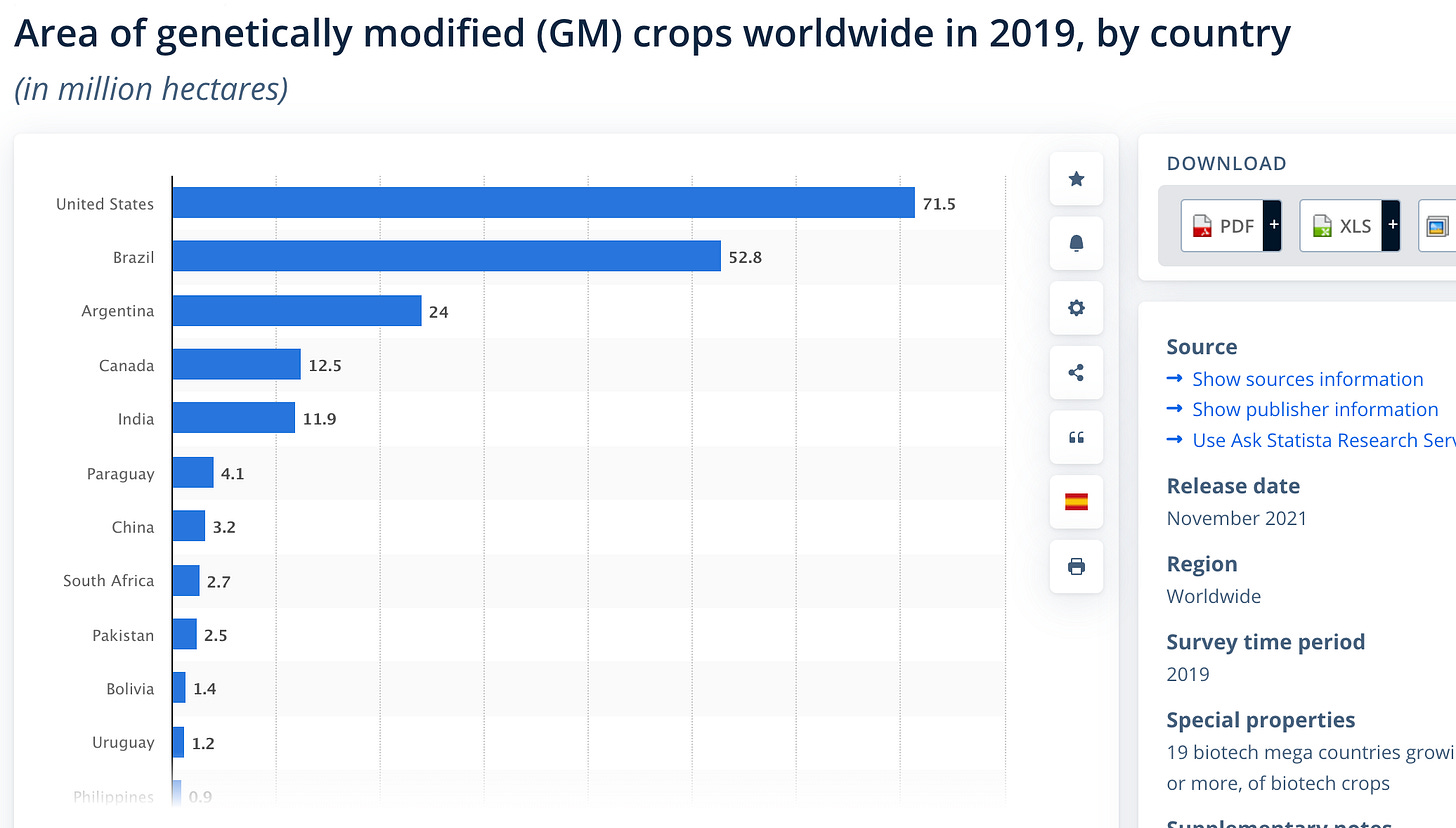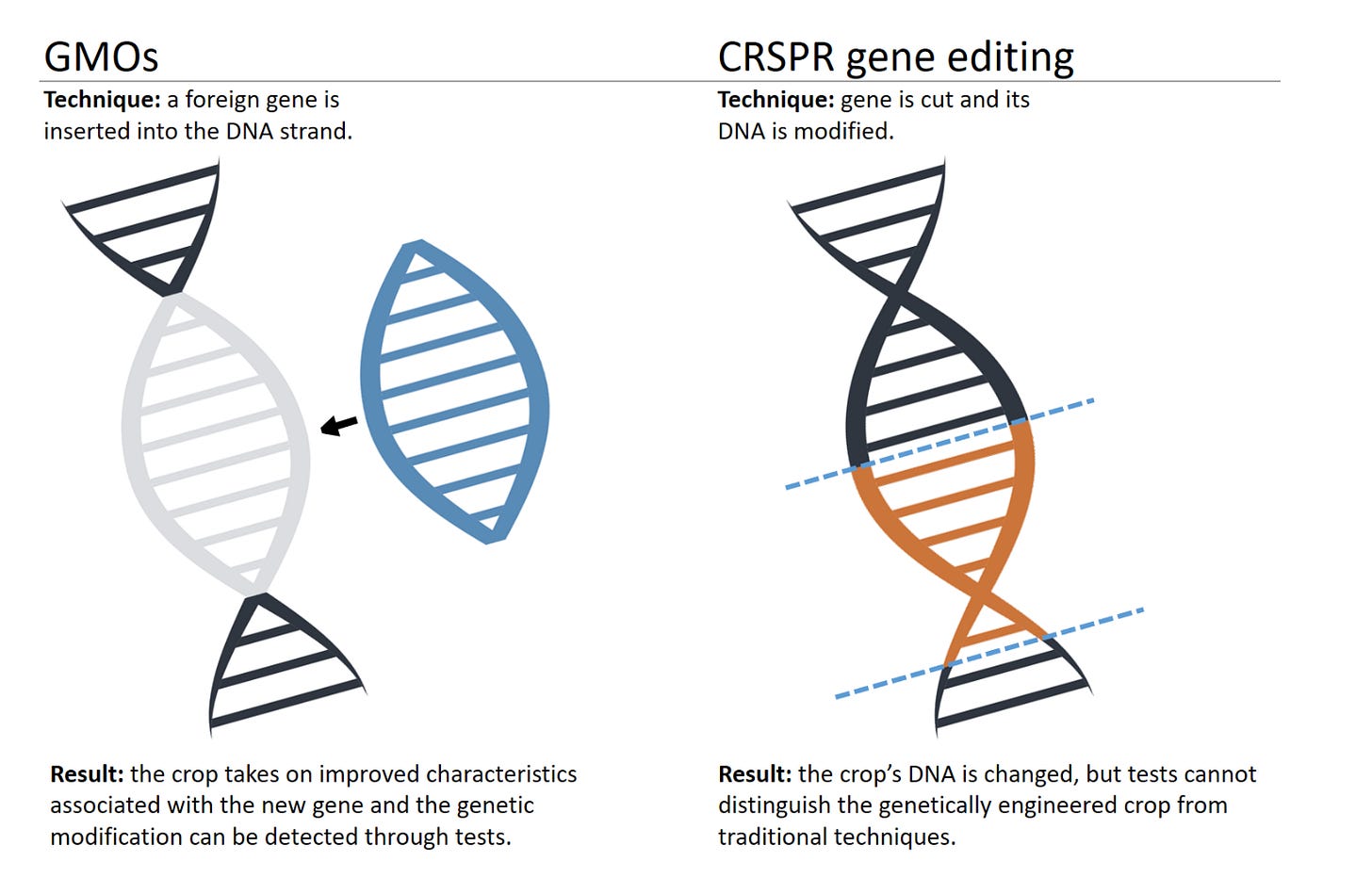Beyond Frankenfood
GMOs: Bridging the Gap Between Science and Public Perception
About
WeClimate is a purpose built investing platform democratizing climate investing through equity crowdfunding. WeClimate enables consumers and retail investors to play an active role in tackling climate change through their investments. We do this by providing a platform for climate tech companies to initiate community investment rounds, enabling loyal customers, followers, and the broader community to become direct investors in private climate startups with a consumer focus.
Active Deals on the WeClimate Platform
Myro is running an indication of interest on the WeClimate platform. Myro makes premium concentrated hotel amenities that save money, save space and save the planet
Check them out here
In AgTech, few innovations have spurred as much debate as genetically modified organisms (GMOs). At their core, GMOs are plants or animals whose DNA has been altered, typically to enhance desired traits or introduce new ones. Think of them as nature's software getting a timely update. On one hand, they offer a tantalizing vision of the future of food: hardier crops, reduced pesticide usage, and solutions to looming global food shortages.
Chances are, you've consumed GMO foods without even realizing it – in 2018, around 92% of corn and 94% of soybeans grown in the US came from genetically modified seeds. Yet, the term 'Frankenfood' looms large in public discourse when discussing GMOs. With the EU's recent move to relax its stringent GMO regulations in the face of climate change, the discourse around GMOs has become even more complex. This tension, reminiscent of historical responses to many innovations, accentuates the need for a balanced, well-informed dialogue on GMOs that merges forward-thinking with genuine public concerns.
From Ancient Fields to Lab Benches
Throughout agricultural history, humankind has exhibited a consistent penchant for influencing the genetic makeup of our crops. Thousands of years ago, our ancestors, armed with observation and patience, practiced selective breeding, allowing only the most favorable plants and animals to reproduce. This age-old technique was a method of nudging nature, moulding it subtly to better suit human needs.
While GMOs are portrayed as the next step in agricultural evolution, addressing issues like food shortages, climate resilience, and health challenges—think of vitamin-fortified rice—we have so far tread cautiously with GMOs. The shift from open fields to laboratory settings for these brings a slew of uncharted territories and potential risks.
While the promises of GMOs are indeed tantalizing, it's crucial to evaluate the broader implications. The potential for unforeseen ecological impacts, long-term human health concerns, and also importantly the ethical dilemma.
Unpacking GMO Concerns
From an ecological standpoint, the prevalence of GMOs has led to an increasing reliance on monocultures — vast stretches of land dedicated to a single crop. This approach might be economically efficient in the short term, but it comes with risks. Monocultures can erode biodiversity, making ecosystems more vulnerable to pests and diseases. Furthermore, the introduction of genetically modified crops might inadvertently harm native species, either by outcompeting them or through unintended crossbreeding, leading to genetic drifts that could have far-reaching ecological consequences.
On the health front, the adoption of GMOs hasn't been without its detractors. There's a segment of the population, backed by some researchers, voicing concerns about the long-term effects of GMO consumption. While immediate adverse effects seem negligible, the long view remains less clear. Economically, the GMO landscape has been shaped significantly by a handful of powerful corporations. The patenting of genetically modified seeds has raised both legal and ethical questions. These patented seeds often come at a premium, putting them out of reach for many small-scale farmers. Furthermore, the recurring need to purchase seeds each season, as opposed to traditional seed-saving practices, can strain the financial resources of these farmers, deepening economic disparities in the agricultural sector.
The Precautionary Principle
Being an avid reader of Nassim Taleb's books, it's hard not to view the discourse on GMOs without the filter of his ideas. Taleb, a scholar and risk analyst, has provided tools like the precautionary principle which emphasize careful and considered action, especially when dealing with systems that possess inherent uncertainties.
At the heart of Taleb's perspective lies the differentiation between risk and uncertainty. In the GMO debate, risk refers to the known potential downsides of modified organisms — for instance, a certain crop's potential allergenicity. Uncertainty, on the other hand, relates to the unknown: unforeseeable interactions and consequences that GMOs might introduce into the intricate dance of the environment and food systems. For Taleb, it's this uncertainty that warrants our utmost caution. He recently discussed it on a podcast with Tim Ferris.
While individual GMOs might pass rigorous safety tests, the real concern is the cumulative and interconnected impact of these organisms when adopted en masse. As ecosystems and agricultural systems are deeply intertwined, an imbalance or failure in one can cascade, leading to broader systemic disruptions. The widespread adaptation of GMOs, in this sense, could be akin to introducing a new variable in an already complex equation, with unpredictable results.
Finally, and perhaps most intriguingly, is the idea of Black Swan events — rare and unpredictable occurrences with monumental consequences. Taleb posits that in our rush to embrace GMOs, we might inadvertently set the stage for such unforeseen events. The issue isn't necessarily with the GMOs themselves but with our limited ability to predict their long-term effects on intricate global systems.
A European Perspective
The European Union, historically reticent about embracing GMOs, is considering a pivot in its stance, driven by the mounting pressures of climate change.
The EU's objective is clear: sustaining crop yields amidst fluctuating climatic patterns such as droughts and floods. By endorsing these gene-edited plants, the EU anticipates diminished reliance on chemical fertilizers, pesticides, and other similar compounds. The overarching goal is to bolster food security and adaptability to climate changes.
However, it's crucial to understand the nuances between gene editing and genetic modification. Gene editing is an accelerated version of traditional breeding where genes from similar species can be added or removed. For instance, a high-yield wheat variety could be merged with another resistant to wind. In contrast, genetic modification usually introduces foreign DNA.
Notably, while some gene-edited plants would sidestep comprehensive GMO authorisation, those that couldn't occur naturally wouldn't. Greenpeace, however, remains skeptical, alluding to the 2018 ruling by the EU’s top court that placed gene editing under the GMO purview. They emphasize caution, underscoring the potential hazards these crops might pose to the environment, pollinators, or human health. While opposition persists, several EU member states seem to favour a relaxed GMO framework.
Potential Global Implications
This shift isn't just a regional matter. By adapting its regulations, the EU could catalyse similar movements in developing countries, particularly in regions facing acute food security challenges. For these nations, the promise of genetically edited crops — ones that can thrive in harsher conditions and yield more with fewer resources — is not just a matter of economic interest, but of survival.
But it's not merely about the science or the potential increase in yields. The EU's regulations have often served as a benchmark for global standards. If the bloc adopts a more lenient approach towards gene-edited crops, it may signal to other nations that these technologies are both safe and essential for the future. Countries might then be more willing to invest in research, collaborate with biotech firms, and encourage their farmers to adopt these new crops.
Furthermore, the global trade dynamic could shift considerably. Many developing nations, previously hesitant to fully embrace GMOs due to potential export restrictions to the EU, might now see an open avenue. Export markets in the EU would not just provide economic relief but could also serve as a validation of the safety and acceptability of these genetically edited crops.
To navigate this landscape, an informed, global perspective is crucial. While science should lead the way, it should be complemented by open dialogues that include farmers, environmentalists, policymakers, and the general public.
Furthermore, as we seek solutions to bridge the chasm between the pro-GMO and anti-GMO factions, actionable steps become imperative. Hosting more transparent forums where voices from all sides can be heard, or even the formation of an international GMO oversight committee, could foster mutual understanding and collaboration.
Thanks for reading!
WeClimate Inc. is a Funding Portal registered with the SEC and FINRA, not endorsed by the SEC and FINRA. Investing in Crowdfunded offerings involves risk, and you should review the risks of a particular investment prior to investing. Visit www.weclimate.co for additional information on services, the crowdfunding portal, regulation, and investment risks. For any inquiries, please direct them to team@weclimate.co.




